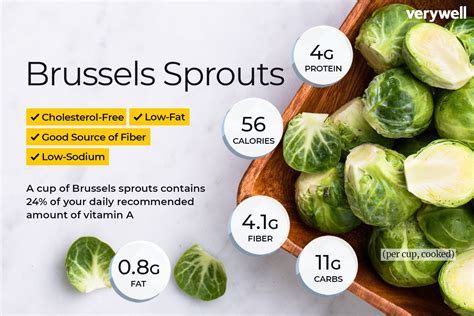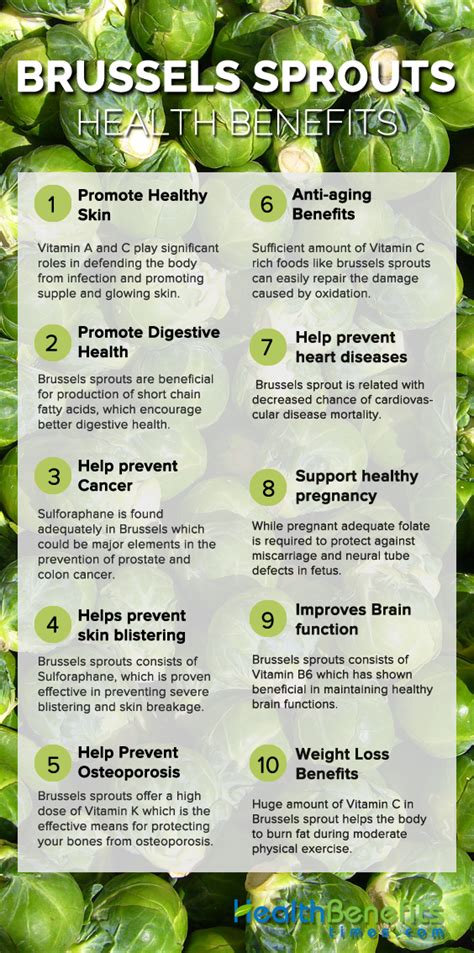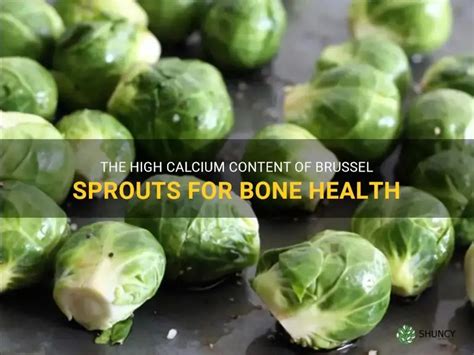Intro
Discover Brussels sprouts nutrition facts, rich in vitamins, antioxidants, and fiber, offering numerous health benefits, including cancer prevention and digestive support, making them a nutritious cruciferous vegetable addition to a healthy diet.
Brussels sprouts are a nutrient-dense vegetable that belongs to the Brassica family, which also includes cabbage, broccoli, and cauliflower. They are a rich source of essential vitamins, minerals, and antioxidants, making them an excellent addition to a healthy diet. With their high nutritional value and potential health benefits, it's no wonder why Brussels sprouts have become a popular ingredient in many cuisines around the world.
The importance of Brussels sprouts lies in their ability to provide a range of essential nutrients, including vitamins C and K, folate, and fiber. They are also low in calories and rich in antioxidants, which can help protect against chronic diseases such as heart disease, cancer, and cognitive decline. Furthermore, Brussels sprouts contain a group of compounds called glucosinolates, which have been shown to have anti-inflammatory properties and may help reduce the risk of certain diseases.
In addition to their nutritional value, Brussels sprouts are also versatile and can be prepared in a variety of ways, making them a great addition to many meals. They can be roasted, steamed, sautéed, or boiled, and can be used in soups, stews, salads, and as a side dish. With their mild flavor and firm texture, Brussels sprouts are a great ingredient for both beginners and experienced cooks.
Brussels Sprouts Nutrition Facts

Vitamins and Minerals
Brussels sprouts are a rich source of several essential vitamins and minerals, including: * Vitamin C: important for immune function, skin health, and iron absorption * Vitamin K: essential for blood clotting and bone health * Folate: crucial for fetal development during pregnancy and red blood cell production * Potassium: helps lower blood pressure and supports healthy heart function * Manganese: plays a role in enzyme function, wound healing, and bone healthHealth Benefits of Brussels Sprouts

Cancer Prevention
The glucosinolates present in Brussels sprouts have been shown to have anti-cancer properties, particularly in reducing the risk of colon, prostate, and breast cancers. The sulforaphane in Brussels sprouts has been found to have anti-proliferative and pro-apoptotic effects, meaning it can help prevent cancer cells from growing and induce apoptosis (cell death) in cancer cells.How to Incorporate Brussels Sprouts into Your Diet

Brussels Sprouts Recipes
Here are some delicious Brussels sprouts recipes to try: * Roasted Brussels Sprouts with Bacon and Balsamic Glaze * Brussels Sprouts and Sweet Potato Hash * Brussels Sprouts and Kale Salad with Lemon-Tahini Dressing * Brussels Sprouts and Mushroom Risotto * Grilled Brussels Sprouts with Lemon and GarlicBrussels Sprouts and Digestive Health

Brussels Sprouts and Gut Health
The gut health benefits of Brussels sprouts are numerous and well-documented. Some of the potential benefits of consuming Brussels sprouts for gut health include: * Supporting the growth of beneficial gut bacteria * Reducing inflammation and improving symptoms of IBS * Promoting healthy digestion and preventing constipation * Supporting the integrity of the gut lining and reducing the risk of leaky gut syndromeBrussels Sprouts and Weight Management

Brussels Sprouts and Metabolic Health
The metabolic health benefits of Brussels sprouts are numerous and well-documented. Some of the potential benefits of consuming Brussels sprouts for metabolic health include: * Reducing the risk of obesity and metabolic disease * Improving insulin sensitivity and reducing the risk of type 2 diabetes * Supporting healthy blood lipid profiles and reducing the risk of cardiovascular disease * Promoting healthy blood pressure and reducing the risk of hypertensionBrussels Sprouts and Bone Health

Brussels Sprouts and Osteoporosis
The osteoporosis benefits of Brussels sprouts are numerous and well-documented. Some of the potential benefits of consuming Brussels sprouts for osteoporosis include: * Supporting healthy bone density and reducing the risk of osteoporosis * Regulating bone mineralization and reducing the risk of fractures * Promoting healthy bone growth and development * Reducing the risk of osteoporosis-related fractures and disabilitiesWhat are the nutritional benefits of Brussels sprouts?
+Brussels sprouts are a rich source of essential nutrients, including vitamins C and K, folate, and fiber. They are also low in calories and rich in antioxidants, making them an excellent addition to a healthy diet.
How can I incorporate Brussels sprouts into my diet?
+Brussels sprouts can be incorporated into your diet in a variety of ways, including roasting, steaming, sautéing, or boiling. They can be used in soups, stews, salads, and as a side dish.
What are the potential health benefits of consuming Brussels sprouts?
+The potential health benefits of consuming Brussels sprouts include reducing inflammation and improving cardiovascular health, supporting healthy digestion and preventing constipation, and providing antioxidant protection against chronic diseases such as cancer and cognitive decline.
We hope this article has provided you with a comprehensive overview of the nutritional benefits and potential health benefits of Brussels sprouts. Whether you're looking to improve your overall health, manage a specific health condition, or simply add some delicious and nutritious recipes to your diet, Brussels sprouts are an excellent choice. So go ahead, get creative with Brussels sprouts, and experience the numerous benefits they have to offer!
